|
|
|
Sort Order |
|
|
|
Items / Page
|
|
|
|
|
|
|
| Srl | Item |
| 1 |
ID:
131415
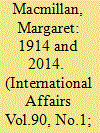

|
|
|
|
|
| Publication |
2014.
|
| Summary/Abstract |
The outbreak of the First World War remains a great historical puzzle and a source of concern, for if we do not understand how it came about we run the risk of stumbling into a similar catastrophe. This article draws parallels between the world of 1914 and the present. It starts with comfortable assumptions made by so many, then and now, that a major conflict was impossible or improbable and then looks at the paradox that globalization not only made the world more interdependent and linked, but also fostered intense local and national identities. It suggests factors that propelled Europe to war in 1914, including national rivalries, imperialism, the arms race and a shifting power balance between rising and declining powers, as well as ideologies and assumptions such as Social Darwinism and militarism, and points out that similar forces and ideas are present today. The article also stresses the dangerous complacency that can arise as a result of decision-makers having successfully dealt with a series of crises. European decision-makers also assumed that they could successfully use war as an instrument of policy and largely ignored or explained away the mounting evidence that the advantage in conflict was swinging to the defence. Again, as the author points out, there are disquieting parallels with the present.
|
|
|
|
|
|
|
|
|
|
|
|
|
|
|
|
| 2 |
ID:
128430
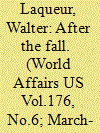

|
|
|
|
|
| Publication |
2014.
|
| Summary/Abstract |
As the Soviet Union disintegrated, ending on the ash heap of history in 1989-91, all the institutes for the study of Marxism-Leninism that had justified the regime, the collected and selected works of the communist classics, and the Marxism chairs in academies and universities also disappeared. From this void emerged a burning question: What was the raison d'être of the existing political system? And later, how did the new regime justify itself in the field of foreign and domestic affairs, and what was its social and economic policy? For the answers, Vladimir Putin and his followers went back to the future. Russia's official ideology prior to 1917 was Pravoslavie, Samoderzhavie,Narodnost, which has been translated as Orthodoxy, Autocracy, Nationality. This statement was made first by Sergei Uvarov, the Russian minister of education, in a circular letter in 1833. Uvarov was a learned man who also served as president of the Russian Academy of Sciences. No one had asked Uvarov to prepare such an official binding declaration. However, Czar Nicholas I liked this "triad," as it was called, even though its meaning was by no means always clear.
|
|
|
|
|
|
|
|
|
|
|
|
|
|
|
|
| 3 |
ID:
133568
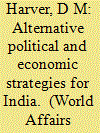

|
|
|
|
|
| Publication |
2014.
|
| Summary/Abstract |
D M Harver analyses the changing patterns of political ideology and economic thinking in India post-1985 and looks at the changing economic philosophy embraced by successive central and state governments. He also traces the main causes of the re-emergence of religiosity as a political factor.
|
|
|
|
|
|
|
|
|
|
|
|
|
|
|
|
| 4 |
ID:
121705
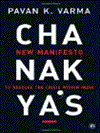

|
|
|
|
|
| Publication |
New Delhi, Aleph Book Company, 2013.
|
| Description |
248p.Pbk
|
| Standard Number |
9789382277095
|
|
|
|
|
|
|
|
|
|
|
|
Copies: C:1/I:0,R:0,Q:0
Circulation
| Accession# | Call# | Current Location | Status | Policy | Location |
| 057367 | 320.5/VAR 057367 | Main | On Shelf | General | |
|
|
|
|
| 5 |
ID:
130608
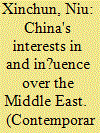

|
|
|
|
|
| Publication |
2014.
|
| Summary/Abstract |
The Middle East became a critical region for China after 1993, when The Beijing became a net oil importer. From this point, it became enmeshed in the complicated regional situation. And so China must realize its basic interests and policy objectives in the Middle East as well as set up an overall, balanced, clear and long-term strategic framework. Policy choices should be made in accordance with such factors as diplomatic tradition, national strength and political ideology
|
|
|
|
|
|
|
|
|
|
|
|
|
|
|
|
| 6 |
ID:
172506
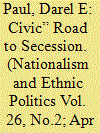

|
|
|
|
|
| Summary/Abstract |
Civic nationalism is a weak vessel for secession. Nonetheless, contemporary Scottish nationalism has proven unusually successful, using the characteristically civic marker of political ideology as its signature boundary mechanism. Because a civic form of nationalism funnels toward civic markers of national identity, nationalist elites define Scotland as social democratic and England as neoliberal. This symbolic cultivation of a Scottish social democratic essence is deeply ethnic, however, through a mythological fusion of ideology with genealogy characteristic of ethnic myths of descent. Scotland’s “civic” nationalism points up the confused nature of the ethnic-civic dichotomy itself.
|
|
|
|
|
|
|
|
|
|
|
|
|
|
|
|
| 7 |
ID:
047825
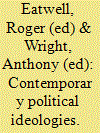

|
|
|
|
|
| Edition |
2nd ed.
|
| Publication |
Jaipur, Rawat Publications, 1999.
|
| Description |
viii, 296p.
|
| Standard Number |
8170337739
|
|
|
|
|
|
|
|
|
|
|
|
Copies: C:1/I:0,R:0,Q:0
Circulation
| Accession# | Call# | Current Location | Status | Policy | Location |
| 047143 | 320.5/EAT 047143 | Main | On Shelf | General | |
|
|
|
|
| 8 |
ID:
197741


|
|
|
|
|
| Summary/Abstract |
In the context of a diverse media landscape grappling with an increasingly stringent political climate, this study asks whether the Chinese government’s media-control policies shape public opinion. Drawing on online survey data collected between 2014 and 2018 and using regression models and inverse probability weighting, I find that in 2017, as Xi Jinping began his second term as general secretary, there was a noticeable conservative shift in the political attitudes of the Chinese public. While foreign media might have reduced support for the Chinese Communist Party’s stance and ideology among those with less exposure to the party-state media, state propaganda did shift public attitudes, offsetting the impact of foreign media. These findings underscore the Party’s effectiveness in using media censorship and propaganda to consolidate its legitimacy in the ideological sphere.
|
|
|
|
|
|
|
|
|
|
|
|
|
|
|
|
| 9 |
ID:
130946
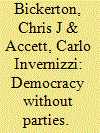

|
|
|
|
|
| Publication |
2014.
|
| Summary/Abstract |
This article looks at the legacy of 'Berlusconism' for Italian politics. On the right, we identify a process of fragmentation. As a result of the personalised leadership of Silvio Berlusconi, where loyalties and ties were to il cavaliere as an individual rather than to a party or a political tradition, there is little by way of legacy on the right. Surprisingly, we find that Berlusconi's greatest legacy lies on the left of Italian politics, in the figure of Matteo Renzi. In his savvy manipulation of the media and in the careful construction of his own image, accompanied by a non-ideological set of political slogans, Renzi has gone even further than Berlusconi. As a result, he may be the one to final bury Italian 'party government' and all its associated traditions and ideals.
|
|
|
|
|
|
|
|
|
|
|
|
|
|
|
|
| 10 |
ID:
169403
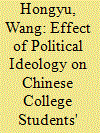

|
|
|
|
|
| Summary/Abstract |
This study investigates the distribution of political ideologies among Chinese college students, and the relationship between political ideologies and students' attitudes towards foreign and domestic affairs. Findings have shown that the distribution of Chinese college students in four ideological groups—nationalist, liberal nationalist, liberalist, and non-liberalist and non-nationalist—is fairly even. Chinese college students across the political spectrum show strong support for China's development in the South China Sea. Liberal Chinese students and the politically apathetic ones adopt a less belligerent attitude towards foreign affairs than their nationalist and liberal nationalist counterparts. In terms of domestic affairs, Chinese college students in general, and Chinese nationalists and liberal nationalists in particular, are satisfied with government performance except for the anti-corruption campaign.
|
|
|
|
|
|
|
|
|
|
|
|
|
|
|
|
| 11 |
ID:
174966
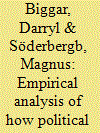

|
|
|
|
|
| Summary/Abstract |
It is known that regulators and customers value stable prices in monopolised energy markets. The purpose of this paper is to investigate what factors influence local energy distributors to care about, and seek to implement, stable prices. Because the literature has suggested that ownership and political ideology affect monopoly pricing behaviour, we pay particular attention to ideological and ownership heterogeneity across a large number of local jurisdictions in Sweden. Specifically, this paper investigates two different pricing aspects; first, actual pricing behaviour in the unregulated Swedish district heating market and, second, survey data where the district heating firms report how important they think price stability is for their level of competitiveness. The results show that district heating firms that operate in municipalities with a left-wing government (i) implement actual prices that follow the long-term price path to a larger extent and (ii) state that smoothed prices are more important for their level of competitiveness. Results are both statistically and economically significant at conventional levels.
|
|
|
|
|
|
|
|
|
|
|
|
|
|
|
|
| 12 |
ID:
178720
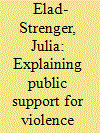

|
|
|
|
|
| Summary/Abstract |
What drives citizens’ support for violence against domestic political actors? Despite its potentially devastating consequences, there is surprisingly little research on the antecedents of this unique form of political violence. Building upon recent insights on the psychological implications of exposure to conflict on support for political violence, we examined the motivations underlying public support for violence against politicians in the context of protracted conflict. Using a two-wave panel design among Jewish-Israelis, we examined the interactive effects of conflict-induced perceived threat, psychological distress, and political orientation on support for violence against politicians. Consistent with previous findings on the psychological implications of conflict, our findings suggest that conflict-induced threat perceptions play an important role in predicting support for violence against politicians. Nevertheless, our findings point to important boundary conditions to these effects: the strength of the relationship between perceived threat and attitudes towards political violence is qualified by the level of chronic conflict-related psychological distress, and the direction of the effects of perceived threat is qualified by individuals’ self-placement on the left-right continuum. More specifically, we found that perceived threat increased rightists’ support and decreases leftists’ support for violence against politicians, only under high, but not low, conflict-related psychological distress. The main conclusion of this study is that support for violence against politicians can be seen as an ideology-driven protective strategy against the negative psychological implications of exposure to violent conflict. By pointing to the importance of understanding the interactive role of psychological and political factors in determining public support for such acts, our findings therefore contribute to the understanding of a relatively understudied phenomenon with potentially catastrophic effects on political stability.
|
|
|
|
|
|
|
|
|
|
|
|
|
|
|
|
| 13 |
ID:
141213
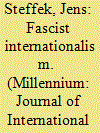

|
|
|
|
|
| Summary/Abstract |
In 1934, the Italian diplomat and scholar Giuseppe de Michelis (1872−1951) published a programmatic book that in English was called ‘World Reorganisation on Corporative Lines’. In this study, de Michelis suggested transferring the socio-economic model of fascist Italy to the global level. He thus envisaged global economic governance by a powerful international organisation and a strict limitation of national sovereignty over the factors of production. My purpose in this article is to explore these largely forgotten proposals as well as the ideological context from which they emerged. The fascist internationalism of de Michelis was technocratic and dirigist, enthusiastic about the possibilities of public planning and the virtues of bureaucratic organisation. This is why his suggestions resembled, in some important respects, world order proposals made by liberal internationalists during the same period. The lesson for International Relations theory is that blueprints for international institutions can be connected to a wide variety of political ideologies. There is no reason to believe that any tradition of political thought is necessarily and eternally committed to internationalism, while others are principally hostile to it.
|
|
|
|
|
|
|
|
|
|
|
|
|
|
|
|
| 14 |
ID:
165963
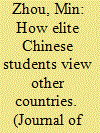

|
|
|
|
|
| Summary/Abstract |
This study examines Chinese university students' feelings towards foreign countries, using original high-quality survey data collected in 2014 at three top universities in Beijing. First, elite Chinese students' perceptions of specific countries are revealed. Being from top universities, these individuals will have great influence on China's future politics and international relations. It is thus important to gauge their perceptions of other countries. They generally feel warmly towards the European Union, Russia, and the United States, but harbour cold feelings towards Northeast Asian neighbours (Japan and the two Koreas). Second, this study finds that the effects of the socio-demographic and political factors underlying students' feelings differ greatly from country to country. I construct various social profiles of the students (dis)liking particular countries. Third, this study establishes a connection between nationalism and feelings towards particular countries. Chinese nationalism is not equally targeted at all other countries. While it elevates animosity mainly against Japan and the US, it promotes a closer rapport with North Korea and Russia.
|
|
|
|
|
|
|
|
|
|
|
|
|
|
|
|
| 15 |
ID:
137799
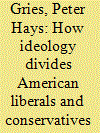

|
|
|
|
|
| Summary/Abstract |
IN A SERIES OF ARTICLES AND A BOOK ON THE ISRAEL LOBBY, realist international relations theorists John Mearsheimer and Stephen Walt argued in 2006–2007 that America's virtually unqualified support for Israel was damaging the U.S. national interest. “Now that the Cold War is over, Israel has become a strategic liability for the United States,” they argue. “Washington's close relationship with Jerusalem makes it harder, not easier, to defeat the terrorists who are now targeting the United States.”1 America's disastrous Middle East policy, they further contend, is best explained by the pernicious influence of the “Israel lobby” in Washington, especially wealthy Jews and the right-wing American Israel Public Affairs Committee (AIPAC).
|
|
|
|
|
|
|
|
|
|
|
|
|
|
|
|
| 16 |
ID:
050241
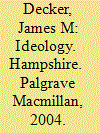

|
|
|
|
|
| Publication |
Hampshire, Palgrave Macmillan, 2004.
|
| Description |
ix, 195p.Pbk
|
| Series |
Transitions
|
| Standard Number |
0333775384
|
|
|
|
|
|
|
|
|
|
|
|
Copies: C:1/I:0,R:0,Q:0
Circulation
| Accession# | Call# | Current Location | Status | Policy | Location |
| 047574 | 813.50938/DEC 047574 | Main | On Shelf | General | |
|
|
|
|
| 17 |
ID:
128868
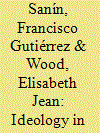

|
|
|
|
|
| Publication |
2014.
|
| Summary/Abstract |
How important is ideology for the analysis of civil war? In contrast to literature that neglects ideology in its emphasis on structural variables or situational incentives, this article argues for the recognition of its essential role in the functioning of armed groups if they are to explain observed variation in armed group behavior. For example, sidelining ideology leaves major phenomena unexplained, including both mass killing and restraint in violence against civilians. Ideology is defined as a set of more or less systematic ideas that identify a constituency, the objectives pursued on behalf of that group, and a program of action (perhaps only vaguely defined). Ideology matters in two ways. First, it has instrumental value for armed groups, socializing combatants with heterogeneous motivations into a coherent group, dampening principal-agent problems, prioritizing competing goals, and coordinating external actors including civilians. Ideologies differ in the kind of institutions and strategies they prescribe for meeting these challenges and in the extent to which they do so. Yet this first approach is incomplete, as ideology has more than instrumental value. Members of some armed groups act on normative commitments in ways not reducible to instrumental reasoning, and some groups constrain their strategic choices for ideological reasons, often normative concerns prescribed by their ideology. Some groups, for example, engage in restraint, declining to use violence though it would have strategic benefit. The conclusion lays out a twin-fold research agenda: a 'weak program' that analyzes the instrumental adoption of ideology and a 'strong program' that explores normative commitments based on particular ideologies and on social preferences.
|
|
|
|
|
|
|
|
|
|
|
|
|
|
|
|
| 18 |
ID:
146709
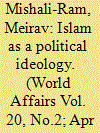

|
|
|
|
|
| Contents |
This article explores the sources of civil strife in Pakistan. It addresses the ongoing theoretical debate on the sources of violent strife, which distinguishes between material and perceptual causes of conflict and places sub-national identities within the context of political and socioeconomic circumstances. The article uses the BFRS Dataset of Political Violence in Pakistan to examine a wide array of deadly incidents from 1988 to 2011. It argues that among the various causes of the continuing conflict, the most prevailing source lies in the role assigned to Islam in Pakistan’s political ideology. In searching for an inclusive nationalism to unite micro identities loosely knitted together within the nation, Pakistan’s elites have drawn on Islam, which had been utilised as the founding logic of the state. In doing so, they have persistently promoted a message of Islamism that has now become the major source of internal strife.
|
|
|
|
|
|
|
|
|
|
|
|
|
|
|
|
| 19 |
ID:
032526
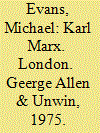

|
|
|
|
|
| Publication |
London, Geerge Allen & Unwin, 1975.
|
| Description |
215p.
|
| Series |
Politial thinkers; no. 3
|
| Standard Number |
0049210211
|
|
|
|
|
|
|
|
|
|
|
|
Copies: C:1/I:0,R:0,Q:0
Circulation
| Accession# | Call# | Current Location | Status | Policy | Location |
| 014975 | 320.5315/EVA 014975 | Main | On Shelf | General | |
|
|
|
|
| 20 |
ID:
045915
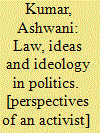

|
|
|
|
|
| Publication |
New Delhi, Har-anand Publications, 2003.
|
| Description |
224p.
|
| Standard Number |
8124109257
|
|
|
|
|
|
|
|
|
|
|
|
Copies: C:1/I:0,R:0,Q:0
Circulation
| Accession# | Call# | Current Location | Status | Policy | Location |
| 046918 | 320.5/KUM 046918 | Main | On Shelf | General | |
|
|
|
|
|
|
|
|
|